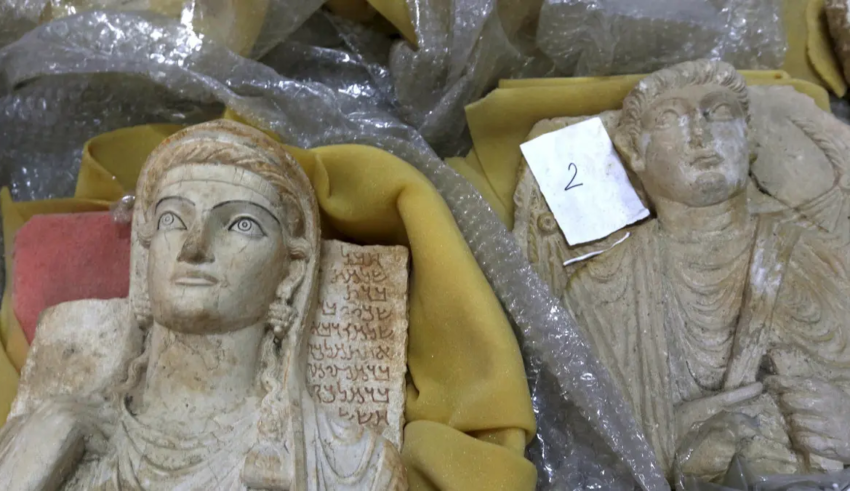
During the past several decades, globalization has played a significant role in the rise of the illicit trafficking of cultural property, as the ease of international travel and the advances in technology and communications erased geographical boundaries in the movement of goods. Besides the in-person antiquities trade, the globalization of technology and the rise of cryptocurrencies have introduced an additional parameter to the problem; the Internet. Elements of the web like anonymity, privacy, and non-personal interactions benefit traffickers. From platforms, like eBay to virtual galleries and social media like Skype, WhatsApp, and Facebook illicit antiquities are increasingly finding their way online. Since 2006 UNESCO, INTERPOL, and ICOM have expressed their concerns about the ongoing increase of illegal trafficking by issuing a statement on the illicit trade in cultural objects via the Internet, titled “Basic Actions concerning Cultural Objects being offered for Sale over the Internet”.
The structure of the antiquities trade via the Internet follows the same pattern in the first two stages as the traditional trafficking; local looters supply early-stage intermediaries who smuggle the antiquities out of the country to transport them further in the market. Internet enters the network in the third stage, where late-stage intermediaries are replaced by auction sites and social media platforms that act as an interface between the dealer and the potential buyer.
Unlike other illicit goods that remain illicit from source to end-user, like drugs and weapons, antiquities at some point in their movement enter the legitimate chain and are sold openly in the legal market, without the need for secrecy. In this framework, Facebook, a publicly accessible online platform, has become not only a digital black market for illicit antiquities trade but also a facilitator to antiquities trafficking networks. It is notable that since 2011 with the unfolding of the Arab Spring, Facebook grew rapidly across the Middle East and North Africa, increasing its user base by 1,200% until 2017 in conflict-ridden countries like Syria, Iraq, Libya, and Yemen. Nowadays, Facebook serves as a gathering point for terrorist groups and criminal networks, who use the platform as a tool to advertise, buy and sell illicit antiquities, among other illicit objects.
Facebook Groups allow users with common interests, in our case antiquities transactions, to interact with each other efficiently and discretely through a safe digital environment. According to their level of privacy, these groups are divided into three categories; public, closed, or secret. Public groups are open and freely accessible to everyone, whether someone is a member or not. Although anyone can search closed groups on Facebook, the user needs to be accepted as a member to join. In contrast, secret groups are not even visible to not members that need to be invited to become one. In closed and secret groups, the administrator regulates the prerequisites for a user to join the group, varying from a simple admin approval to a list of membership questions. It is usual for such groups to include a question related to commission policy, in the sense that the members are expected to pay a fee to the admin, known as a khums tax for any sales made through the group. The local looters in IS’ held territory were obliged to pay a khums tax to the terrorist organization to acquire a looting and smuggling license. The khums tax provision implies a connection of such groups to ISIS’s operations in the antiquities trade, revealing that ISIS is still involved in the exploitation of antiquities, just moved to a new medium. The question here is to what extent Facebook, through khums tax, facilitates terrorism financing, considering that the payment is likely carried out through a digital transaction, using Facebook Messenger app at the moment, or Facebook-sponsored cryptocurrency.
Whether a Facebook group operates as a sale and auction group or simply as a discussion forum affects how the sale is been conducted. Adding the numerous features that Facebook provides to its users, from photos, videos, posts, and replies to disappearing “Stories”, live streaming videos, and encrypted messaging, a well-hidden underground antiquities market can easily flourish on the platform. In sale groups, the potential sellers post images and videos for the artifacts they wish to advertise, while in discussion forums users post a photo asking for information on the antiquity depicted. The response will often include a WhatsApp number, implying private communication offline to arrange the sale. In addition, users can also post want ads expressing interest in specific items, the so-called loot-to-order requests. However, there is no evidence that looting is exercised to fulfill such specific requests, rather broad interests are expressed.
While cases of illicit antiquities trafficking through Facebook are becoming more and more frequent, Facebook still has not included “illicit cultural property” in the “Promoting or Publicizing Crime” section of their Community Standards and in their Commerce Policies as prohibited items. In addition, under the 47 U.S. Code § 230 on “Protection for private blocking and screening of offensive material” Facebook has no responsibility for the content published by a third person, enjoying a kind of immunity. Unlike America’s weak regulation over social media, the EU is planning any time soon to adopt legislation on Facebook’s legal responsibility for what is posted online via the so-called Digital Service Act.
By The European Institute for International Law and International Relations.















